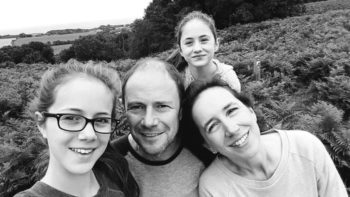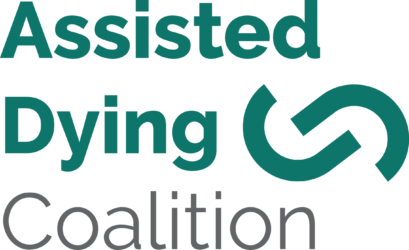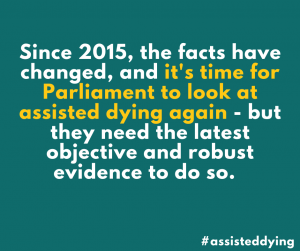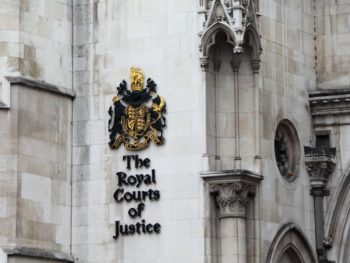The post Phil Newby asks High Court for the right to challenge the UK’s ban on assisted dying appeared first on My Death, My Decision.
Phil Newby, a man who is facing incurable suffering and wants the right to challenge the UK’s ban on assisted dying, yesterday appealed for permission before the High Court.
The 49-year-old father of two, who suffers from the degenerative condition motor neurone disease, has already raised over £42,000 in donations from the public.
Phil could not attend court in person, but his legal team argued that the UK’s current prohibitive law breaches his human rights to a private and family life. They have invited the court to examine a growing body of international evidence in support of assisted dying and asked for the right to cross-examine expert witnesses.
In court, Phil’s lawyer, Paul Bowen QC, told Lord Justice Irwin and Mrs Justice May that Phil’s case differed from previous legal cases as if successful, it would allow adults of sound mind the ability to request an assisted death, in circumstances where they suffer from an incurable disease which causes them unbearable suffering and cannot otherwise be palliated.
Characterising the options which the Government said were already legally available to Phil as ‘inhumane’, Mr Bowen went on to say that the issue to the heart of the case was whether Phil could exercise a degree of autonomy at the end of his life.
Nearly 90% of the public now favours a change in the law on assisted dying for those, like Phil, who are facing incurable suffering, in at least some circumstances.
Assisted dying is now permitted for terminally ill and incurably suffering people in Canada, Belgium, Italy, Luxembourg, and the Netherlands. It is also permitted specifically for specifically terminally ill people in Colombia, ten US jurisdictions, and the Australian state of Victoria.
Phil is being supported by the campaign group My Death, My Decision, who unlike some other right-to-die organisations, do not believe that assisted dying should be restricted to only those who are terminally ill with a prognosis of six months or less.
Earlier in the day, Phil Newby said:
‘By bringing this case I’m laying down the gauntlet, asking our most senior judges to examine the evidence on assisted dying in detail.
I am hugely thankful to everyone who has helped me get this far. Many of those who have donated to support the case have direct experience of our outdated and cruel law. Reading the comments of supporters on Crowd Justice is both heart-breaking and stirring. Like me, some are staring into a bleak future where no choice exists for a dignified death. Others are the traumatised loved ones of terminally ill people who felt they had no option but to end their own lives. I sincerely hope that the court will grant permission so that all the issues can be fully aired with my lawyers having the chance to cross-examine the witnesses who argue against a change in the law and the government having the same right with my expert witnesses.’
My Death, My Decision’s Chair, Trevor Moore said:
‘Phil Newby faces an inexcusably cruel dilemma. Until the law changes, his only options in due course are to die through the painful process of starvation or through the indignity of succumbing to his illness. Years have now passed since Parliament last considered this issue, and new evidence has emerged from progressive countries, including Canada, which demonstrate that robust safeguards can be balanced alongside respect for autonomy.
Nearly 90% of the public now agree that those facing incurable suffering deserve the right to a peaceful, painless, and dignified death, in at least some circumstances. We strongly hope that our courts will use this opportunity before them, and act in the interests of reason and empathy by agreeing to examine the evidence put before them.
We believe that adults of sound mind, who are either terminally ill or facing incurable suffering, deserve the right to safeguarded assisted dying. That is why we support both Phil Newby’s and Paul Lamb’s legal cases.’
NOTES
For further comment or information or requests for interviews, please contact My Death, My Decision’s Campaigns and Communications Manager Keiron McCabe at keiron.mccabe@mydeath-mydecision.org.uk or phone 020 7324 3001.
Details of the Case
Phil Newby, 49, a father of two from Rutland, was diagnosed with the progressive and degenerative medical condition, motor neurone disease in 2014. He is represented by Saimo Chahal QC of Bindmans LLP, Paul Bowen QC of Brick Court Chambers, Adam Wagner of Doughty Street Chambers, and Jennifer Macleod of Brick Court.
Phil is a member of and supported by the campaign groups My Death, My Decision (MDMD), Friends At The End (FATE), and Dignity in Dying.
If successful, Phil’s case would allow adults of sound mind the ability to request an assisted death, in circumstances where they suffer from an incurable disease which causes them unbearable suffering and cannot otherwise be palliated.
On 21 May 2019, Phil submitted an application to judicially review Section 2(1) of the 1961 Suicide Act. The court was invited to grant a declaration of incompatibility under the Human Rights Act 1998, on the grounds that the 1961 Suicide Act is incompatible with Phil’s rights under Article 2 (right to life) and Article 8 (right to a private and family life). In addition, the court was also invited to allow a preliminary issue of cross-examining expert witnesses to be appealed directly to the UK Supreme Court. On 27 September, the High Court handed down a judgment denying permission for the case to proceed.
On Tuesday 22 October, Phil’s legal team attended the High Court to appeal this decision. If permission is granted, a full hearing of the case will follow.
For legal comment or interviews with Phil Newby’s legal team at Bindmans LLP, please contact Saimo Chahal QC at s.chahal@bindmans.com or by telephone on +44 20 7833 4433
The law on assisted dying in the UK
Under section 2(1) and 2(2A) of the 1961 Suicide Act, it is unlawful in England and Wales to encourage or assist someone to end their life. Anyone found guilty of an act ‘capable of encouraging or assisting the suicide or attempted suicide of another’ can face up to 14 years’ imprisonment.
Following Debbie Purdy’s case, the then Director of Public Prosecutions, Sir Keir Starmer MP, issued guidance on factors indicating when a prosecution will and will not be brought for assisting another to die. One factor tending against prosecution is when a ‘suspect was wholly motivated by compassion’. Consequently, between April 2009 and January 2019, there have been 148 cases of assisted dying referred to the Crown Prosecution Service (CPS) by the police, but only 2 successful prosecutions.
In 2014, Jane Nicklinson, the widow of locked-in sufferer Tony Nicklinson, and Paul Lamb, who is paralysed from the neck down, challenged the law on assisted dying in the Supreme Court. The court held that Parliament should be afforded the opportunity to debate the issue before the courts would rule on whether the law is incompatible with the rights of those who are both terminally ill and facing incurable suffering.
In 2015, parliament rejected by 330 against to 118 in favour, Rob Marris’ private members’ bill to legalise assistance for those who were terminally ill and likely to die within 6 months.
Under Section 1(2) of the 1982 Forfeiture Act, an individual who assists a loved one to end their life abroad can have their inheritance withheld, even if the CPS deems that it is not in the public interest to bring forth a prosecution.
Recent Developments
In September, the Quebec Superior Court struck down a restriction under Canada’s law on assisted dying, against those with progressive and incurable illnesses. Following the judgment, unless the Federal Government challenges the decision within six-months, those with intolerable but non-life threatening conditions will be able to request an assisted death. Also in September, Italy’s constitutional court held that people should not always be punished for assisting another to die, if a person is in a state of intolerable and irreversible suffering.
In July, My Death, My Decision’s patron, Paul Lamb, who is paralysed from the neck-down, separately applied to the High Court to challenge the UK’s law on assisted dying.
In June, the British Medical Association and Royal College of GPs announced that they would poll their members on assisted dying. Their announcement follows the Royal College of Physicians ending their long-standing opposition to assisted dying and adopting a neutral position in March 2019.
About My Death, My Decision
My Death, My Decision is a grassroots non-profit that campaigns for a balanced and compassionate approach to assisted dying in the UK. We believe that everyone deserves access to excellent palliative care but that adults of sound mind, who are either terminally ill or facing incurable suffering, should have the right to a peaceful, painless, and dignified death. Through the work of our members, supporters, patrons, and activists we help to broaden the public debate on assisted dying and seek to secure changes in the law.
Read more about how nearly 90% of the public support an inclusive change in the law.
Read more about how one Briton a week now ends their life in Switzerland.
Read more about My Death, My Decision’s campaign for an inclusive change in the law:
https://www.mydeath-mydecision.org.uk/
 Assisted dying campaigner Phil Newby, who suffers from motor neurone disease and has been pushing for a change in the law on assisted dying, has been denied permission by the Court of Appeal.
Assisted dying campaigner Phil Newby, who suffers from motor neurone disease and has been pushing for a change in the law on assisted dying, has been denied permission by the Court of Appeal.
 The post
The post  Phil Newby, who has motor neurone disease, has today been refused permission by the High Court to challenge England and Wales’s prohibitive law on assisted dying. Humanists UK has expressed disappointment at the decision, but hopes it doesn’t affect the separate case of Paul Lamb, who is
Phil Newby, who has motor neurone disease, has today been refused permission by the High Court to challenge England and Wales’s prohibitive law on assisted dying. Humanists UK has expressed disappointment at the decision, but hopes it doesn’t affect the separate case of Paul Lamb, who is  Humanists UK is encouraging all of its
Humanists UK is encouraging all of its 